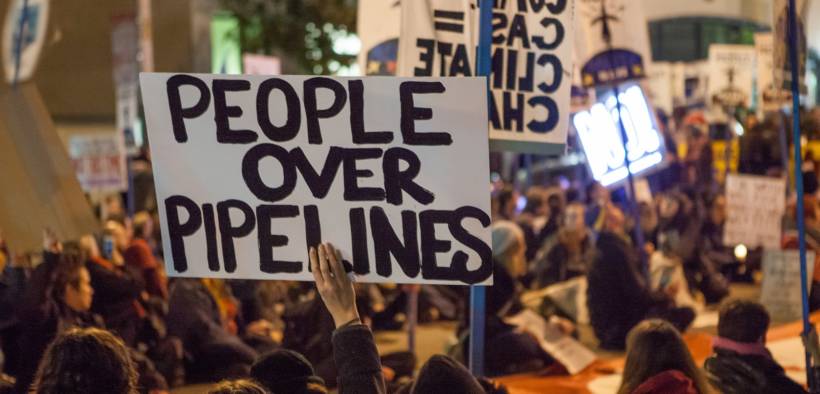Canadian Police Arrest Pipeline Protestors, Invade Indigenous Land

“This…truly proves that industry, not the people, can control the province and its laws.”
The Royal Canadian Mounted Police (RCMP) have arrested over 20 protesters of a pipeline that would cut through the land of the Wetʼsuwetʼen, a First Nations people.
The arrests have come after a British Columbia Supreme Court judge issued an injunction paving the way for the RCMP to arrest the Wetʼsuwetʼen protesters.
Two Wet’suwet’en Nation members argued that Coastal GasLink had no permission to enter their traditional land since they did not have permission under Wet’suwet’en law. However, the judge disagreed and ruled against the First Nations people saying Canadian law does not forbid Coastal GasLink from entering.
Coastal GasLink is planning to construct a $5 billion, 670-kilometer natural gas pipeline that would cut through the land of 20 First Nations tribes, and it argued it has agreements with the other tribes. But, Wet’suwet’en members continue to resist the pipeline construction despite the threat of arrest.
Police Tactics
The RCMP has used the injunction as a justification to begin raiding Wetʼsuwetʼen lands in an attempt to force out protesters and defenders of the land.
The land defenders have accused the RCMP of using distraction tactics and misinformation to flush them out of the land.
They alleged the RCMP agreed to a meeting at 10 AM with hereditary leaders while they told those at a checkpoint to leave by 11 AM. However, instead of attending the meeting they surrounded the protesters at the checkpoint and threatened them with arrest.
“They have not given anyone the opportunity to leave, and they have gone against every single thing they said to the hereditary chiefs,” said a spokesperson for a clan that in the Wet’suwet’en Nation, in a Facebook video Saturday.
She continued, “This is all the RCMP tactics. This is how they do their business, by saying they’re going to meet with us while at the same time going in with guns blazing.”
Previously, the protesters had access to a control checkpoint, however, the RCMP restricted access to the area only allowing protesters to go to the area with an officer present.
The RCMP opened an investigation into the damage sustained to a bridge near the main protest camp, but protesters have argued that it was the police who caused the damage.
Solidarity, Indigenous Rights and Climate Justice
Climate and indigenous rights groups throughout the country have organized protests and events in solidarity with the Wetʼsuwetʼen people. Several indigenous groups also organized events to show their support.
Protest actions have included the blocking of rail lines, sit-ins at the British Columbia legislature, and protests all the way in Seattle at the Canadian embassy. Youth climate activist Greta Thunberg even tweeted out support for the Wetʼsuwetʼen and said, “Indigenous rights = Climate justice.”
The coalition between environmental rights and climate justice has been a long-standing issue in Canada, and Canada’s Green Party has regularly shown support for the protesters. In 2018, Green Party leader Elizabeth May was arrested for protesting the construction of two pipelines.
However, the Green Party of Canada is small with only 3 seats in the 338-seat parliament.
On the other hand, Prime Minister Justin Trudeau has been a friend to the oil and gas industry, and he signed off on another pipeline expansion in June 2019.
“We need to create wealth today so we can invest in the future,” Trudeau said about the pipeline. “We need resources to invest in Canadians so they can take advantage of the opportunities generated by a rapidly changing economy, here at home and around the world.”
While the Wetʼsuwetʼen requested a meeting with the Prime Minister, Trudeau and his staff have dodged questions and not responded to the request to sit down with the Wetʼsuwetʼen.
“In this time of reconciliation, with B.C. being the first province to legislate UNDRIP [the UN Declaration on the Rights of Indigenous Peoples], this ruling by a court in B.C. against Indigenous rights and recognition truly proves that industry, not the people, can control the province and its laws,” Dini’ze Na’moks of the Tsayu Clan said.








BULLSHIT! The REAL Wetsuweten have AGREED to the SECOND pipeline going across their Reserve because it means more OIL ROYALTIES FOR THE BAND!! THESE FAKE WETSUWETEN ARE A BUNCH OF NON INDIGENOUS PEOPLE SLANDERING ACTUAL INDIGENOUS PEOPLE!!